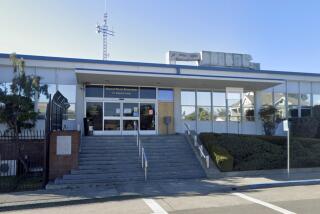Seattle agrees to independent monitor to oversee police
- Share via
SEATTLE -- The city of Seattle has agreed to set up an independent monitor and a community police commission to settle a review by the U.S. Justice Department, which had accused police of routinely escalating minor encounters with citizens and resorting to unnecessary use of batons, flashlights and other weapons.
The memorandum of understanding provides for federal court oversight of a multi-year reform effort, similar to agreements that have been put into place in troubled cities across the country, including Los Angeles and -- earlier this week -- New Orleans.
“We have a shared belief that effective policing and constitutional policing go hand in hand,” Thomas E. Perez, assistant attorney general for civil rights, said at a press conference announcing the settlement, reached after months of sometimes fractious negotiations with the city.
The agreement calls for a detailed overhaul of the city’s policies on use of force, with officers required to report even minor confrontations as well as undergo exhaustive new training to alleviate racial and ethnic bias. The department will be required to provide “clear guidance” that so-called social contacts between officers and citizens are voluntary and make clear that investigatory stops that lack reasonable suspicion are prohibited.
An independent monitor is to be selected within 60 days to oversee implementation of the settlement, a process federal and city officials said will be lengthy.
“We have years -- let’s make it clear -- years of implementation work ahead of us. It’s critical that we get this right,” City Attorney Pete Holmes told reporters.
The Justice Department opened its inquiry after the American Civil Liberties Union and a variety of community groups sought a civil rights investigation into long-standing complaints about unwarranted beatings, kickings and stompings, unnecessary arrests and in some cases needless killings at the hands of police officers.
Public outcry reached a peak in August 2010, when an indigenous totem carver walking with his carving knife was shot to death by a police officer only about four seconds after the officer had commanded him to put it down.
Federal civil rights investigators concluded in December that the Seattle Police Department had engaged in a “pattern or practice” of excessive force in violation of the Constitution and said it also had “serious concerns” about practices that could lead to discriminatory policing. When officers used batons, investigators found, they did so unnecessarily nearly 60% of the time.
The targets were most often people with mental illnesses or under the influence of alcohol or drugs, many of whom had committed only minor offenses, the investigation found.
Seattle has been reeling from a wave of gun violence in recent months, prompting city officials to resist the idea of imposing unwarranted controls that prevent police from doing their job. Mayor Mike McGinn said he has also worried that some of the Justice Department proposals on the table could have been too expensive and resulted in fewer officers on needed street patrols.
“I … know that this community is deeply concerned about crime. We’ve heard, in light of the recent gun violence, calls for our police to be more aggressive and assertive,” McGinn said.
But he said the agreement announced Friday is a good solution that resolves the city’s concerns and provides for reforms that city officials endorse and in many cases already had planned to implement.
“With their support, we negotiated in good faith to ensure that our agreement protected public safety, responded to community concerns, aligned with Seattle values and addressed the unique challenges of our city,” he said.
“This city is committed to eliminating bias,” the mayor said.
Perez said the more than eight years that the Los Angeles Police Department spent under supervision of an independent monitor as a result of a similar consent decree produced widely perceived improvements. LAPD supervision was lifted in 2009.
“As a result of these reforms that were put in place in Los Angeles, crime went down, the quality and quantity of policing went up, and public confidence in the police department shot up,” he said.
“The work ahead is not easy. This work will require time, persistence, a sound plan and effective leadership. The great news is that all of these ingredients are in place in Seattle.”
ALSO:
Corcoran exhibit is simple but difficult: An artist, asleep
Northeast storms cause lightning strike to steeple, killing man
Gay marriage in Washington: Amazon’s Jeff Bezos gives $2.5 million
More to Read
Sign up for Essential California
The most important California stories and recommendations in your inbox every morning.
You may occasionally receive promotional content from the Los Angeles Times.










